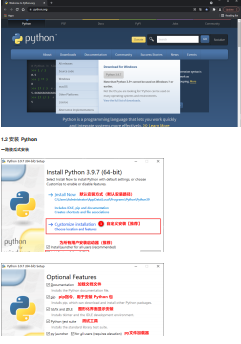给大家整理了相关的编程文章,网友曹婧妍根据主题投稿了本篇教程内容,涉及到python加密主机文件、python加密文件、python加密主机文件相关内容,已被653网友关注,涉猎到的知识点内容可以在下方电子书获得。
python加密主机文件
数据加密是一种保护数据安全的技术,通过对数据进行编码,使得未经授权的用户无法读取或改动数据。
加密是通过使用加密算法和密钥实现的。加密算法是一种特定的算法,可以将数据编码成不可读的形式,密钥是一串字符串,用于控制加密和解密的过程。加密后的数据只能使用对应的密钥解密。
加密在保护数据的安全性方面非常重要,尤其是在互联网和移动设备环境中,用户的隐私数据容易遭到黑客的攻击。加密技术不仅可以保护数据的隐私,还可以保护数据的完整性,确保数据不被篡改。
在企业环境中,数据加密也被广泛应用于保护公司数据的安全。从合同到秘密文件,加密技术可以保护公司数据不被未经授权的人员查看。
总的来说,数据加密是一种重要的保护数据安全的技术,对于任何用户和企业都非常重要。
要求:利用python对某个目录的全部文件进行加密,密钥由用户的输入的字符串经过变化而生成,封装为一个函数,输入参数有目录路径和用户输入的字符串。
以下是使用 Python 实现的一种简单的文件加密方案:
import os import hashlib def encrypt_directory(directory, password): for root, dirs, files in os.walk(directory): for file in files: path = os.path.join(root, file) with open(path, 'rb') as f: data = f.read() key = hashlib.sha256(password.encode()).hexdigest() encrypted_data = bytearray(x ^ ord(key[i % len(key)]) for i, x in enumerate(data)) with open(path, 'wb') as f: f.write(encrypted_data)
该函数接收两个参数:目录路径和用户输入的字符串。它通过使用 os.walk 对目录下的每个文件进行加密,并将加密后的数据写回文件。加密使用了异或操作,密钥是对用户输入的字符串进行 SHA-256 哈希的十六进制字符串。
以下是对上面的加密函数的对应解密函数:
scssCopy code
def decrypt_directory(directory, password):
for root, dirs, files in os.walk(directory):
for file in files:
path = os.path.join(root, file)
with open(path, 'rb') as f:
encrypted_data = f.read()
key = hashlib.sha256(password.encode()).hexdigest()
data = bytearray(x ^ ord(key[i % len(key)]) for i, x in enumerate(encrypted_data))
with open(path, 'wb') as f:
f.write(data)
该函数与上面的加密函数类似,但是它读入加密后的文件,并使用相同的密钥对数据进行异或操作,以获得原始文件。
将上述代码更换加密算法,使用AES加密,代码如下:
import os import hashlib from Crypto.Cipher import AES def encrypt_directory(directory, password): # 计算密钥 key = hashlib.sha256(password.encode()).digest()[:16] for root, dirs, files in os.walk(directory): for file in files: path = os.path.join(root, file) # 读取文件 with open(path, 'rb') as f: data = f.read() # 对数据进行补位 padding_length = 16 - len(data) % 16 data += bytes([padding_length] * padding_length) # 初始化加密器 cipher = AES.new(key, AES.MODE_ECB) # 加密数据 encrypted_data = cipher.encrypt(data) # 将加密后的数据写回文件 with open(path, 'wb') as f: f.write(encrypted_data) def decrypt_directory(directory, password): # 计算密钥 key = hashlib.sha256(password.encode()).digest()[:16] for root, dirs, files in os.walk(directory): for file in files: path = os.path.join(root, file) # 读取文件 with open(path, 'rb') as f: encrypted_data = f.read() # 初始化解密器 cipher = AES.new(key, AES.MODE_ECB) # 解密数据 data = cipher.decrypt(encrypted_data) # 删除补位数据 padding_length = data[-1] data = data[:-padding_length] # 将解密后的数据写回文件 with open(path, 'wb') as f: f.write(data)
注:上面的代码仅供参考,不建议在生产环境中使用。AES ECB 模式并不是很安全,应该使用其他模式。
或者使用非对称加密:
这里使用RSA加密算法实现数据的加密解密:
import os import rsa def encrypt_file(file_path, public_key_file): """使用RSA算法加密文件 参数: file_path: 需要加密的文件路径 public_key_file: 公钥文件路径 返回值: 无 """ # 读取文件内容 with open(file_path, "rb") as file: file_content = file.read() # 读取公钥 with open(public_key_file, "rb") as key_file: public_key = rsa.PublicKey.load_pkcs1(key_file.read()) # 加密文件内容 encrypted_content = rsa.encrypt(file_content, public_key) # 将加密后的内容写入文件 with open(file_path, "wb") as file: file.write(encrypted_content) def decrypt_file(file_path, private_key_file, password): """使用RSA算法解密文件 参数: file_path: 需要解密的文件路径 private_key_file: 私钥文件路径 password: 私钥文件密码 返回值: 无 """ # 读取文件内容 with open(file_path, "rb") as file: encrypted_content = file.read() # 读取私钥 with open(private_key_file, "rb") as key_file: private_key = rsa.PrivateKey.load_pkcs1(key_file.read(), password) # 解密文件内容 file_content = rsa.decrypt(encrypted_content, private_key) # 将解密后的内容写入文件 with open(file_path, "wb") as file: file.write(file_content)
需要注意的是,RSA加密的效率较低,适用于加密少量数据,如对文件进行加密
到此这篇关于使用python加密主机文件几种方法实现的文章就介绍到这了,更多相关python加密主机文件内容请搜索码农之家以前的文章或继续浏览下面的相关文章希望大家以后多多支持码农之家!









